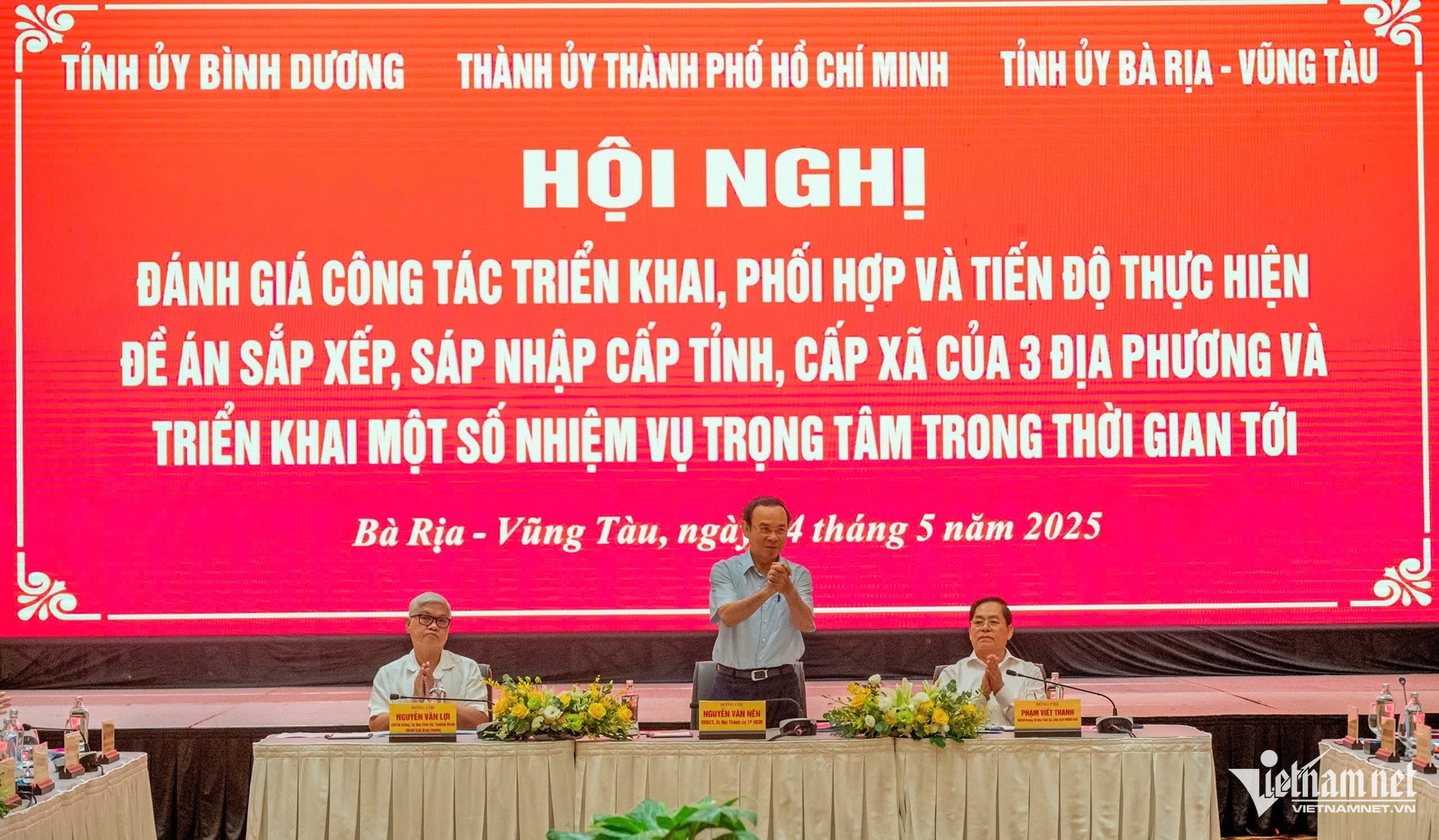The Party Committees of HCMC, Binh Duong, and Ba Ria - Vung Tau on May 14 jointly held a conference to assess the implementation, coordination, and progress of the provincial and communal administrative restructuring project, and to outline key upcoming tasks.
HCMC Party Secretary Nguyen Van Nen, Binh Duong Party Secretary Nguyen Van Loi, and Ba Ria - Vung Tau Party Secretary Pham Viet Thanh co-chaired the conference.

Nguyen Van Nen, Nguyen Van Loi, and Pham Viet Thanh co-chair the restructuring conference.
Nguyen Thanh Nghi, Standing Deputy Secretary of the HCMC Party Committee, reported that the city has urgently coordinated with Binh Duong and Ba Ria - Vung Tau to thoroughly implement the policy of streamlining administrative structures.
The aim is to ensure an efficient, effective, and modern apparatus suited to current urban and socio-economic development demands.
The three provinces have jointly established steering committees and working groups to draft the restructuring proposal, regulations, and implementation plans.
To date, all three localities have developed plans to restructure commune-level administrative units and submitted them to the Party Executive Committees and Standing Committees. Public consultations have been conducted, followed by submissions to the Provincial and Municipal People’s Councils and the central government.
According to Nghi, the new HCMC will consist of 168 commune-level units (113 wards, 54 communes, and 1 special zone), a 61.9% reduction from the current 441 units.
For naming new communes, the three provinces agreed not to duplicate names across the new city to facilitate management and administrative record-keeping. Naming will align with tradition, culture, and local history.
Particular emphasis is placed on names deeply embedded in residents' heritage, such as: Saigon, Cho Lon, Gia Dinh; Ba Ria, Vung Tau, Phu My, Dat Do; Binh Duong, Thu Dau Mot, Thuan An, Di An.
Regarding the adjustment of administrative boundaries, local governments have reviewed and corrected certain areas to eliminate inefficiencies. These changes aim to streamline governance, maintain long-term public order, and improve citizen access to government services.
Minimizing impacts on government employees
While preparing the restructuring plan, authorities from all three localities collaborated actively, exchanging information and contributing feedback.
Preparations focused on the use of public assets, location of government offices, and the reorganization of civil servants and administrative staff to align with the streamlined structure.
To mitigate the effects on public employees, the provinces are prioritizing staff retention and development. This includes supporting their work security, retaining high-quality personnel, and continuing training to ensure they meet post-merger political and administrative demands.
In the near future, the three provinces will complete a draft proposal for establishing the HCMC Party Committee, which will be submitted to the relevant authorities. Simultaneously, they will finalize plans for dissolving existing district and commune-level Party Committees, paving the way for new units. Personnel arrangements for the ward and commune-level Party Committees are also underway.
Speaking at the conference, HCMC Party Secretary Nguyen Van Nen highlighted the significance of this meeting, calling it a pivotal start toward transforming the region into a global-standard megacity. This new HCMC will serve as a dynamic growth hub for the Southeast and a symbol of hope and progress for the entire country.
Nen stated that the merger is not merely about pooling resources such as budgets, land, and infrastructure, but more importantly, about creating breakthroughs in governance, policy, and institutional frameworks. This sets the stage for bold experimentation and accelerated, synchronized development.
Under the plan, the main political-administrative headquarters will remain in present-day HCMC, with additional branches in Ba Ria - Vung Tau and Binh Duong during the initial transition phase. Further options will be explored over time.
Quang Hung